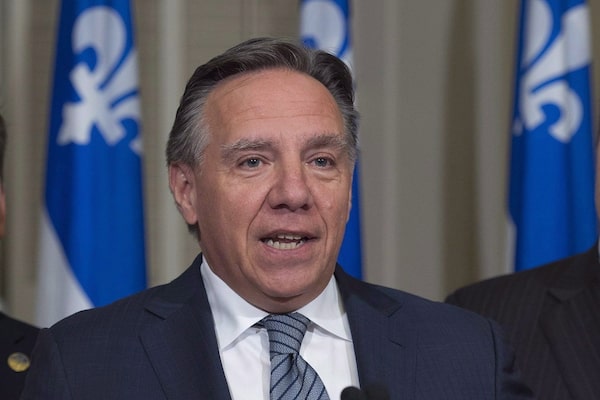
'These measures are hard, but they are also temporary,' Quebec Premier François Legault, seen here on October, 2016, said Tuesday.Jacques Boissinot/The Canadian Press
Wine and beer and cannabis are still sold in Quebec and Ontario but vapers are out of luck.
In Ontario, real estate agents, small hardware stores and bicycle repair shops can still operate, but not in Quebec.
Canada’s two largest provinces both announced Monday that non-essential businesses should close to help contain the spread of COVID-19.
But, as attention turned to details in each province’s lists of essential services, questions emerged about the discrepancies between Ontario and Quebec, while businesses that were left out of the lists tried to make the case that they should not have to shut down.
“These measures are hard, but they are also temporary,” Quebec Premier François Legault said Tuesday.
Both he and Ontario Premier Doug Ford insisted that there will be some fine tuning. “This list can be adjusted. It’s an open list,” Mr. Ford said.
Ontario’s list is more detailed and explicit than Quebec’s selection. National Bank economist Stéfane Marion estimated that Quebec will shut down 10 per cent more of its economy when compared with Ontario.
“I hope they have found a middle ground because it makes a big difference,” Mr. Marion said.
“If Quebec keeps its list, it will necessarily impact Ontario negatively as the two provinces are big trading partners.”
While some businesses pushed to be added as essential services, the provinces also faced calls from labour to close down more services to protect workers from potential exposure to the new coronavirus.
The Ontario Construction Consortium, which represents unionized workers, called for an immediate two-week shutdown of work sites but on Tuesday, Mr. Ford said that provincial inspectors would ensure safety protocols are heeded.
How the lists were drafted underlined the complexities of society as the two governments said they wanted to protect the economy’s supply chains.
Mr. Legault said allowances will be made for aluminum plants, for example, that were initially ordered closed. The Premier had learned that a minimal operation must be maintained for a quick relaunch once the shutdown is over.
Mr. Ford said his government conferred with 100 people representing business associations and labour groups.
Ontario Liberal Leader Steven Del Duca said the Ford government needed to explain why its list is broader than Quebec’s. “We have seen quite a number of businesses declared essential in Ontario that have not been declared essential in Quebec … it would be helpful to know why."
Employees in liquor and cannabis-retail outlets pushed against their continuing operations, saying they needlessly had to be in proximity of the public.
The Canadian Addiction Counsellors Certification Federation warned that closing liquor stores could create worse problems. “If you abruptly stop the access to alcohol people will start to jam the ERs with alcohol withdrawal, which is incredibly serious and life threatening.”
Furthermore, Quebec supermarkets and corner stores, which are essential services, also sell beer and cheap wine. "I don't want to see any chaos in groceries to get some alcohol if we close the [liquor stores],” Mr. Legault said.
Similarly, other choices, such as listing dry cleaners as essential services, might seem superfluous but are needed by people with disabilities, Ottawa sociologist Jihan Abbas said.
Dry cleaners are important for people with difficulties controlling their urinary systems, said Dr. Abbas, an instructor at Ryerson University’s School of Disability Studies. “Something might not be essential for you but it might be for someone else.”
The Canadian Vaping Association, meanwhile, asked for the inclusion of vape shops. “By limiting sales to e-commerce only, the black market will flourish, and unsafe products will enter the market,” association executive director Darryl Tempest said.
Rodrigue Escayola, who practises condo law at Gowling WLG, was relieved that Ontario’s list explicitly mentioned property-management companies, a nod to the fact that 1.6 million Ontarians live in condos overseen by 12,000 boards.
With more people home-bound in their units, condos have to manage the increased use of common elements, he said. “Keeping people at home in single dwellings in suburbia is very, very different from keeping people at home in condo land.”
Ontario’s list also mentions real-estate-agent and land-registration services and bicycle shops while Quebec makes no mention of those businesses.
Julie Saucier, president of the Quebec Professional Association of Real Estate Brokers, said her group wanted to convince the government that excluding them would affect households that need to complete a real estate transaction.
Magali Bebronne, a program manager for Vélo Québec, said her non-profit group, which promotes bicycle use, asked the government to add bike shops to transport services still allowed to operate. Using bicycles would lessen the crowding in public transit, she said.
Some businesses had to persuade lawmakers to designate them as essential. Nancy Raymond, chief executive of Steamatic, said her company, which specializes in post-disaster cleanup, contacted members of the Quebec and Ontario legislatures and reminded them that it would be needed, especially during the spring floods.
Quebec’s association of hardware stores and lumber yards wrote to the Legault government because the first list of essential services included big-box hardware stores, but not smaller retailers. “There are numerous villages where only a small hardware store can answer to critical needs,” association president Richard Darveau said.
“Listen, we’re not the first level of essential service, but if your fuse pops or toilet leaks you have to fix them,” said Serge Blain, owner of Beaubien Hardware in Montreal. Quebec relented and added all hardware stores late Tuesday.
With reports from Nicolas Van Praet and Laura Stone
Sign up for the Coronavirus Update newsletter to read the day’s essential coronavirus news, features and explainers written by Globe reporters.
 Tu Thanh Ha
Tu Thanh Ha Les Perreaux
Les Perreaux